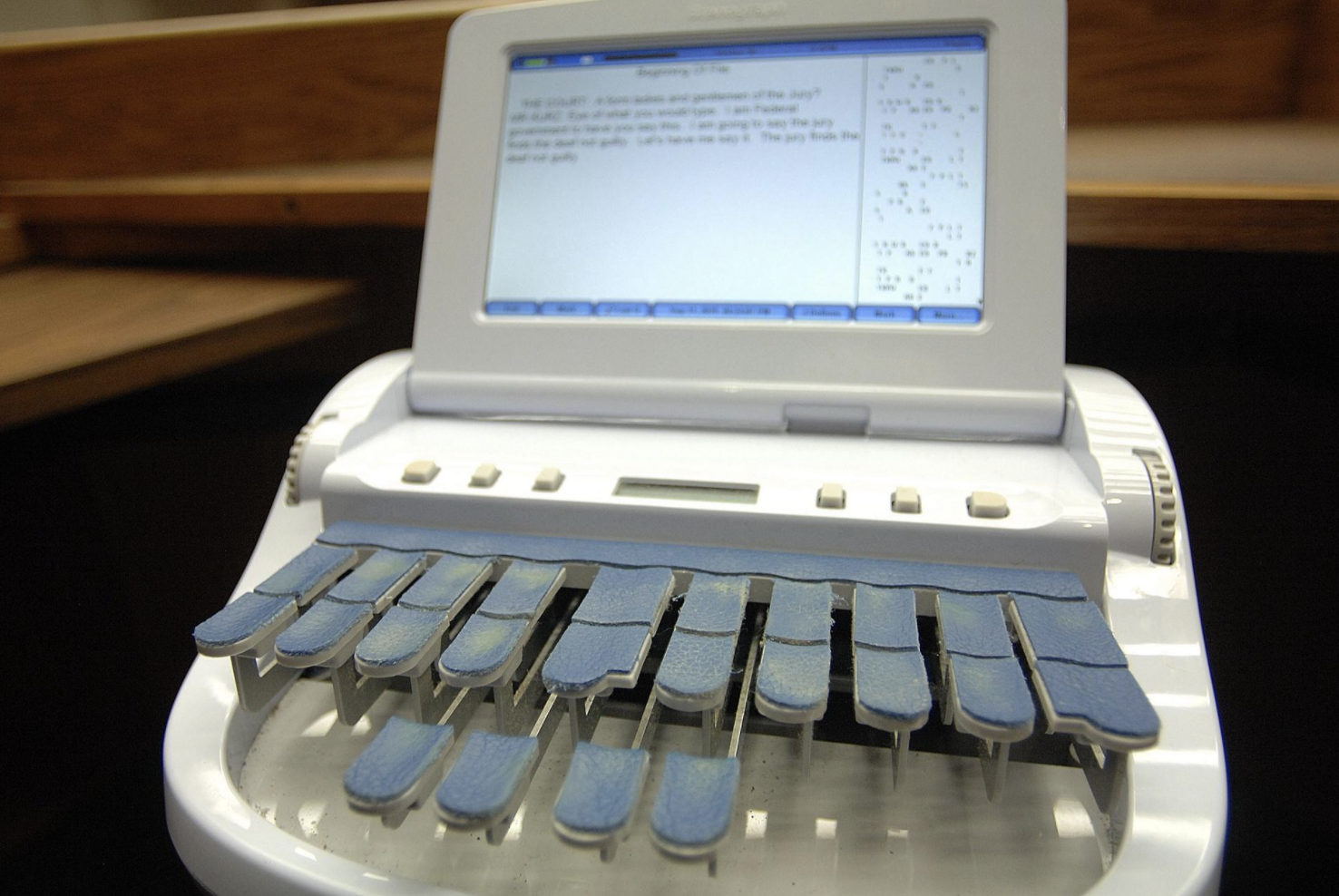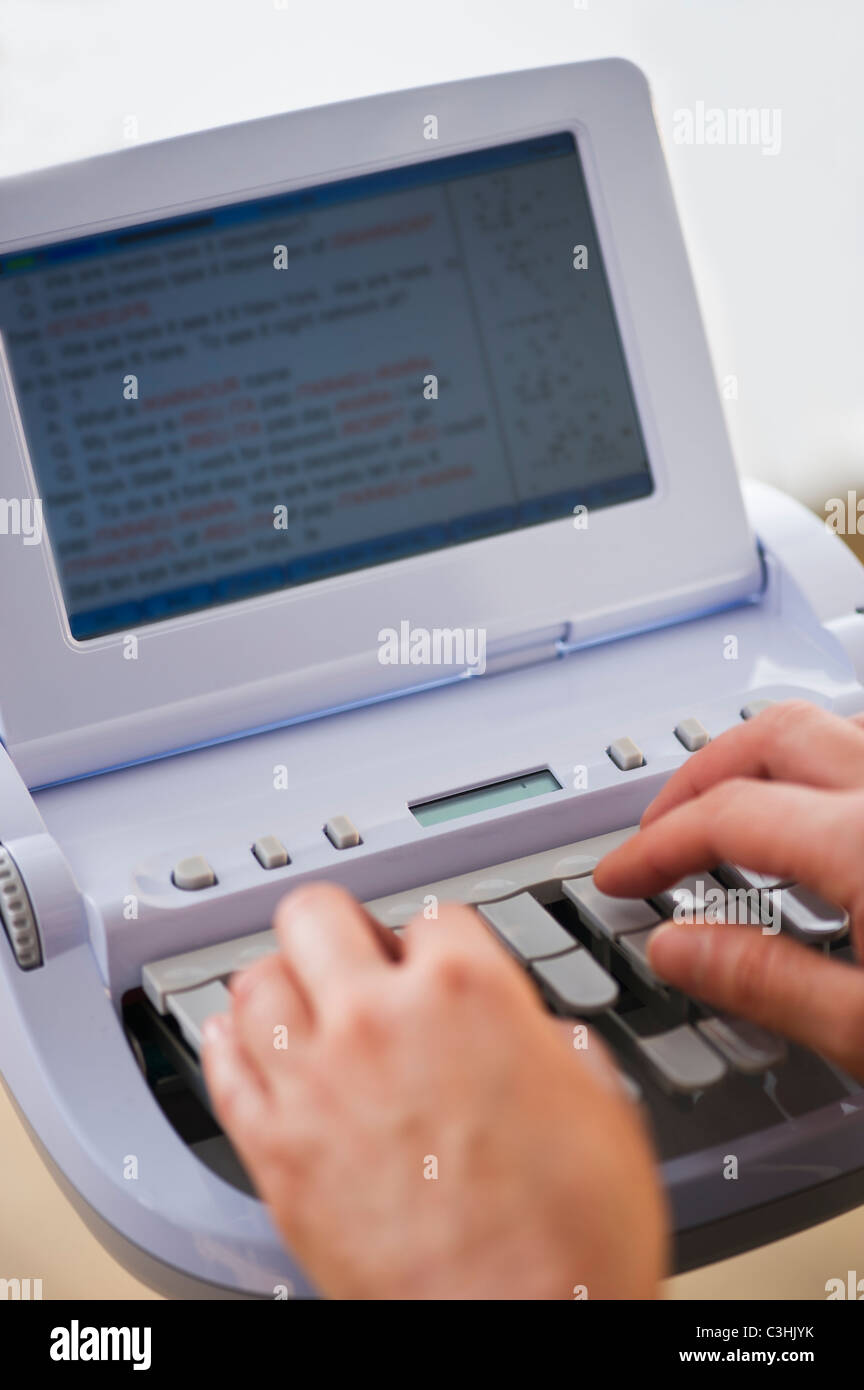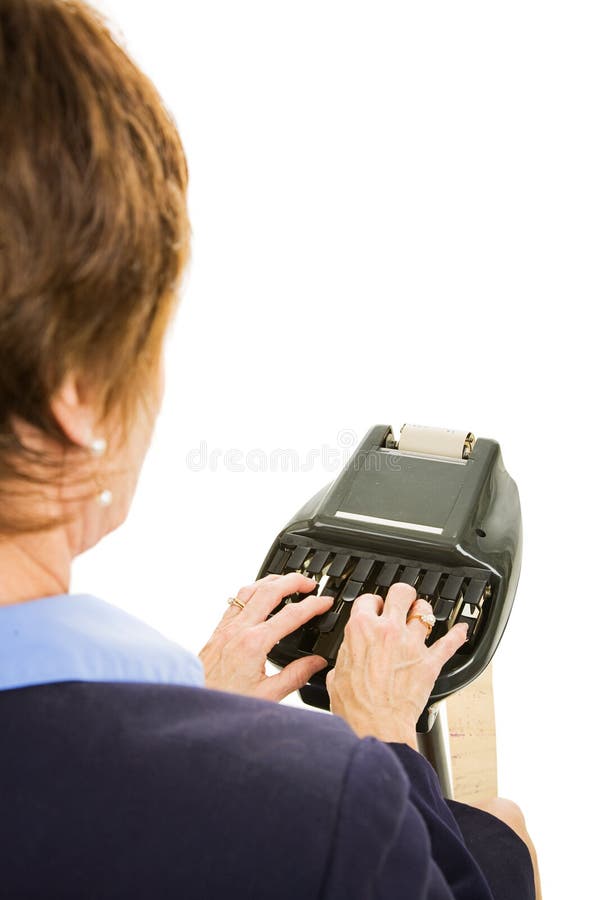Interview Tips for Landing Your First Job as a Court Typist
Interview Tips for Landing Your First Job as a Court Typist
Blog Article
Discover the Important Skills and Obligations of a Court Typist in Today's Legal Landscape
As a court typist, you hold a critical position in the lawful system. Your skills go beyond just keying; they include recognizing complex lawful terms and treatments while making sure accuracy in every file. You collaborate carefully with courts and attorneys, making your duty vital for effective communication. Yet what particular abilities do you require, and how can you adapt to the ever-evolving technical landscape? Let's explore this additionally.
The Duty of a Court Typist in the Judicial System
As the backbone of the judicial system, a court typist plays a necessary duty in guaranteeing that legal procedures are properly recorded. You're responsible for transcribing whatever from witness testaments to judges' rulings, recording every detail with precision. Your work assists preserve a irreversible and clear record of court activities, which is vital for future referral and appeals.In the courtroom, you're frequently the unrecognized hero, silently ensuring that all spoken words end up being composed documents. You keep discretion, recognizing the delicate nature of lawful matters. You additionally team up closely with courts, staffs, and legal representatives to guarantee the smooth flow of details. By functioning successfully under stress, you add to the overall performance of the judicial procedure. Your interest to detail and commitment to precision not just promote the honesty of the court however likewise support the broader pursuit of justice in culture.
Necessary Skills Required for Court Typists
Court typists require an unique mix of abilities to master their essential duty within the judicial system. You need to have outstanding typing abilities, typically achieving rates of 70 words per minute or even more. Accuracy is crucial; also a minor mistake can result in considerable misconceptions in legal records. You'll likewise need strong focus to information, making certain every word is recorded correctly.Additionally, good business skills are crucial for handling multiple cases and papers successfully. Being tech-savvy is necessary, as you'll utilize different software application for word handling and file monitoring. Strong interaction abilities help you connect with judges, legal representatives, and other court employees effectively.Lastly, a sense of expertise and privacy is a must, as you'll deal with delicate details daily. By refining these abilities, you'll be well-prepared to contribute substantially to the courtroom atmosphere.
Recognizing Lawful Terminology and Treatments
As a court typist, you need to realize crucial legal terms and treatments to perform your job properly. Recognizing these concepts not just assists you record properly yet also guarantees you can comply with the flow of court proceedings. Let's discover the necessary lawful vocabulary and an introduction of court processes you need to understand.

Secret Legal Terms
Comprehending essential legal terms is vital for any person functioning in a court environment. You'll regularly run into terms like "complainant," which refers to the person launching a claim, and "defendant," that replies to the allegations. Recognizing the distinction between "civil" and "criminal" cases aids you realize the context of the procedures. Familiarity with "subpoena" warranties you comprehend the legal files engaging witnesses to affirm. Additionally, terms like "proof" and "testimony" are important, as they connect directly to the details provided in court. Mastering these terms not just enhances your efficiency as a court typist but likewise ensures that you add to the precision and clearness of lawful papers. Your duty hinges on specific terminology, so do not take it lightly!
Court Procedures Summary
Experience with crucial lawful terms establishes the stage for understanding court treatments. Understanding just how a courtroom functions is essential for any type of court typist. You'll experience procedures like accusations, where offenders listen to fees, and motions, which are requests for a court ruling. Acquaint on your own with the functions of staffs, lawyers, and courts, as each plays an important part in process. Understanding the circulation of a test-- from jury choice to shutting arguments-- assists you precisely record the procedures - court typist. In addition, recognizing the importance of keeping a unbiased and exact document can't be overstated. By understanding these components, you'll improve your effectiveness in recording necessary court activities and contribute substantially to the lawful process. Your function is critical in maintaining the honesty of court documents
The Influence of Modern Technology on Court Typing
Innovation's changed court typing in considerable ways. With digital transcription devices, you can raise effectiveness and accuracy, making your task much easier than ever. Plus, remote court procedures have transformed exactly how you approach your job, calling for flexibility to brand-new formats and modern technologies.
Digital Transcription Devices
As electronic transcription tools proceed to evolve, they're transforming the means court typists do their responsibilities. These devices simplify the transcription process, allowing you to record spoken words accurately and successfully. With voice recognition software program, you can transcribe real-time process, minimizing manual input and decreasing errors.Moreover, cloud-based platforms make it possible for simple access to files, so you can function collaboratively with legal groups and ensure everybody's on the same page. Automated formatting functions conserve you time on repeated jobs, allowing you concentrate on content quality.Additionally, electronic tools boost safety, safeguarding sensitive information with encrypted storage space and controlled accessibility. By embracing these innovations, you can enhance your performance and maintain the high requirements required in the legal area.
Remote Court Process
The rise of remote court procedures has significantly transformed the landscape for court typists. You currently depend on technology to record and transcribe real-time hearings from your home or workplace. Familiarity with video clip conferencing platforms is essential, as you'll need to navigate them effortlessly to assure an exact document. You'll also need to handle audio high quality, as history noise or link concerns can interrupt your work. Furthermore, remote proceedings require fast thinking; you might need to clarify statements or request repeats in real-time. Staying organized and reliable is vital, as target dates stay tight. Welcoming these technical innovations not only improves your abilities yet additionally ensures you remain a very useful property in today's developing lawful atmosphere.
Precision and Attention to Information in Transcription
Precision and focus to detail are essential in transcription, specifically for court typists. court typist. Every word counts when you're transcribing lawful proceedings. A single error can alter the go to these guys significance of a declaration, possibly affecting the end result of a case. You must pay attention meticulously, guaranteeing that you record every nuance and inflection in the speaker's voice.Your capability to catch typos and grammatic mistakes is necessary. You do not just type; you verify that the last document is an exact representation of what was claimed in court. This requires a keen eye and a comprehensive understanding of lawful terminology.Moreover, you'll require to be acquainted with different accents and speaking designs, as courts can hold a range of speakers. By honing your accuracy and focus to information, you'll preserve the honesty of legal papers and contribute noticeably to the judicial procedure. Your persistance around absolutely makes a difference

Time Administration and Business Abilities
While handling several tasks, reliable time management and business skills are crucial for court typists. You'll usually manage different due dates, from transcribing court procedures to preparing lawful papers. Prioritizing your workload is important; identify immediate tasks and tackle them initially to guarantee timely submissions.Organizational skills enter into play when you're sorting through case files, notes, and records. Maintaining everything neatly categorized not just conserves time but additionally reduces the threat of error. Making use of tools like schedules, order of business, or specialized software program can assist you remain on track and manage your time effectively.Moreover, establishing specific objectives for every work session can improve your productivity. Damage larger tasks into smaller sized tasks to make them extra manageable. By honing these abilities, you'll not only boost your performance yet likewise add considerably to the smooth operation of the lawful process, assuring whatever runs like clockwork.
Proceeding Education and Professional Growth Opportunities
Investing in your abilities doesn't quit with time management and organization. As a court typist, you'll discover that proceeding education and learning and professional development are important to remaining affordable in the lawful field. Search for workshops or on the internet training courses concentrating on advanced inputting methods, lawful terms, and transcription software application. These can develop your skills and assist you adjust to the most recent technologies.Networking is equally essential. Join expert companies like the National Court Reporters Organization (NCRA) or neighborhood legal associations. They usually offer resources, training sessions, and meetings that can enhance your understanding and link you with peers.Don' t forget regarding accreditation programs that can improve your reputation and marketability. Staying upgraded with the current trends and best practices in legal documents will certainly boost your performance and precision, making you an indispensable asset to any type of legal group. Purchase your development, and you'll enjoy the incentives throughout your job.
Frequently Asked Questions
What Is the Typical Income Range for a Court Typist?
A court typist's typical wage varieties from $30,000 to $55,000 yearly, depending upon experience and location. You might additionally discover opportunities for development with extra skills, resulting in increased pay in the lawful area.

Are Court Typists Required to Have a Legal Level?
Court typists do not need a legal degree, yet having one can be beneficial. You'll frequently locate that solid keying abilities and expertise of lawful why not look here terms are a lot more vital for success in this duty.
What Are the Job Hours for a Court Typist?

Just How Do Court Typists Make Sure Privacy in Their Work?
You ensure discretion by securely dealing with sensitive files, making use of encrypted software program, and complying with stringent protocols. You stay knowledgeable about privacy legislations and only share info with accredited employees, keeping rely on the judicial procedure.
Can Court Typists Work From Another Location or Freelance?
Yes, you can work from another location or freelance as a court typist, especially if you have trusted technology and a safe atmosphere. Numerous attorneys currently welcome remote job, using flexibility and chances for independent typists. As the foundation of the judicial system, a court typist plays an essential duty in ensuring that legal process are precisely documented. As a court typist, you require to understand vital legal terms and treatments to perform your work properly. Grasping these terms not only boosts your performance as a court typist however additionally assures that you contribute to the accuracy and clarity of lawful files. The rise of remote court proceedings has actually considerably transformed the landscape for court typists. As a court typist, you'll discover that proceeding education and learning and expert growth are crucial Get the facts to staying competitive in the legal area.
Report this page